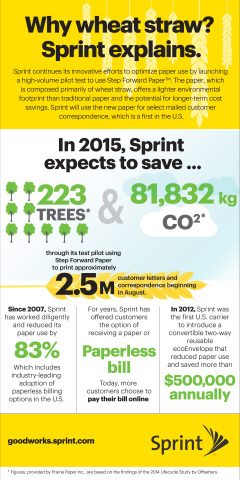In its latest effort to optimize paper use and reduce environmental impact, Sprint will pilot a new kind of forest friendly paper for customer mailings in the coming months. The paper, made of wheat-straw byproduct, is not noticeably different to the naked eye than wood-derived paper. However, it offers a new, sustainable alternative and potential longer-term cost savings as additional paper sources and suppliers are introduced into North America.
Sprint’s pilot to use the wheat-straw paper for mailed customer correspondence is reportedly a first in the U.S. Prairie Paper Inc. spent 15 years in research and development and in 2012 launched the production of its wheat-straw based paper, Step Forward Paper™. The paper is made of 80% wheat-straw waste and 20 percent Forest Stewardship Council® (FSC®) certified wood fiber. Step Forward requires 65% less land area to produce one ton of paper on an annual basis than virgin tree-based paper and 50% less land area than paper with 30 percent recycled content.
Today, Step Forward Copy Paper is available in the U.S. exclusively through Staples.com and Staples Advantage. Sprint said it has reduced the total weight of printing paper it has purchased annually by 83% since 2007.
Prairie Paper noted that Sprint’s approach to test-pilot the use of its paper in roll form will increase demand and showcase how paper made from agricultural waste fibers can compete on quality and price. The company’s goal is to establish a market that will support plans to build a pulp and paper mill facility in North America, which will enable us to produce this paper with an even smaller environmental and economic footprint.
FOLLOW ME ON THESE SPACE
Discussion
Comments are closed.